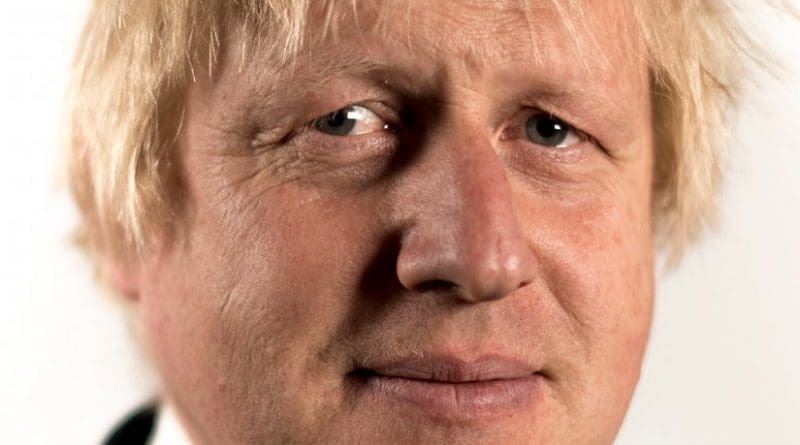An ‘Earthquake’ Has Struck UK Politics – OpEd
By Arab News
By Chris Doyle*
Confounding pundits, the Conservatives have won a sizeable majority of probably 78 seats, beyond what even Tory optimists predicted — an “earthquake,” in the words of Prime Minister Boris Johnson.
In a Brexit election, the Conservative position on “getting Brexit done” clearly chimed in with voters, either because they always wanted to leave, or because they respected the need to honor the 2016 referendum. The UK will now definitely leave the EU in January.
Johnson has mounted an astonishing political comeback, based on his undoubted charisma and populist appeal. A year ago, out of government, he was languishing on the backbenches. He then won a handsome victory in the party leadership, and against many predictions, even got a withdrawal agreement with the EU.
A majority of 78 would be the largest for the Tories since the days of Margaret Thatcher, and would give Johnson the sort of political room for manoeuver that no prime minister has enjoyed since Tony Blair’s win in 2001.
Johnson’s chief opponent Jeremy Corbyn has dragged Labour to its lowest result since 1935 with just 203 seats, even worse than the crushing 1983 defeat. Frequently, he was toxic on the doorstep and savaged on the issue of anti-Semitism in the party.
He will step down before the next election, but it is hard to see how a leadership battle does not kick off now in all but name. Many Labour members blame Corbyn’s leadership and policies, while his supporters will battle to keep the party in the hands of the hard left. Expect a huge bust up over who replaces him.
One of the most seismic elections in recent history was in many ways a hold-your-nose-and-vote occasion. No party, no leader, no political figure warmed the nation or cut through the empty slogans. Johnson hiding in a fridge to avoid a TV interview in the last few days of campaigning summed up much of the election.
On the doorsteps, the overwhelming sense was one of anger, frustration and even embarrassment at the rotten state of the British body politic. For many, it was a case of who they despised the least.
Civil servants sat nervously. Not for decades have they had to prepare for two such diametrically opposed outcomes. The head of the Foreign Office, for example, will have had to plan for a Britain outside the EU, desperate for trade deals and ever closer to the Trump administration, or a Britain perhaps still in the EU, and prepared to impose arms sales bans to Israel, rip up the special relationship with the US and embrace EU partners. Strangely, therefore, international affairs barely figured as a subject for debate.
In times gone by, elections sometimes appeared not to offer much of a choice. In this election, the choice was between chalk and cheese. A very right-wing Conservative approach promised that getting Brexit done would allow the rest of the nation’s problems to be resolved.
Against that was a Labour Party promising a return to huge spending plans and determined to invest in public services, but also to nationalize core sectors such as the railways, energy supply networks, water companies and even broadband Internet. This harked back to the 1970s, and it was not clear how Labour could afford these extraordinary steps.
The two main parties engaged in siloed conversations to different constituencies. The Conservatives just wanted to talk about getting Brexit done. The Tories had a powerful central message to end this gridlock.
Among their base this works, and even among others it was potent.
Labour, caught in a Brexit dilemma where the party was massively divided, wanted to talk about pretty much anything else, but above all the future of the National Health Service. Corbyn’s neutrality on the Brexit issue was more of a liability than his most ardent followers believed.
The Brexit Party never quite fired, and did not get a single candidate even close to being elected to Westminster. Yet it had a huge influence on the election even before the starting gun was fired. Nigel Farage’s party dragged the Conservatives even further to the right, to a harder-line Brexit position. In a sense, this was job half done.
One of the most extraordinary aspects was the lack of intensive debate on Brexit or scrutiny of party plans. It was slogan heavy. Few details emerged as to what a future trade deal with the EU might contain. Few details were provided as to the sort of withdrawal deal a Labour government would seek.
The other major winner of the night was the Scottish National Party (SNP). Its sweeping gains in Scotland, taking 48 of 59 seats, herald a huge battle for the union. SNP leader Nicola Sturgeon will insist this is a mandate for a referendum on independence.
Across the waters in Brussels, as much as Johnson is not widely popular, this newfound certainty will be quietly welcomed. In Washington, President Donald Trump lost no time in congratulating his friend Johnson and promising a huge US-UK trade deal.
The electorate has delivered what British politics has lacked for a while: A touch of certainty. The endless battles between government and Parliament are probably over, but this is only the end of Brexit stage one.
Next year will be all about security, a future trade agreement with the EU, and whether a deal can be reached by the end of 2020. That looks very touch and go. With a sizeable majority, Johnson can be free to be a bit more flexible that he might have imagined.
- Chris Doyle is director of the London-based Council for Arab-British Understanding. Twitter: @Doylech

